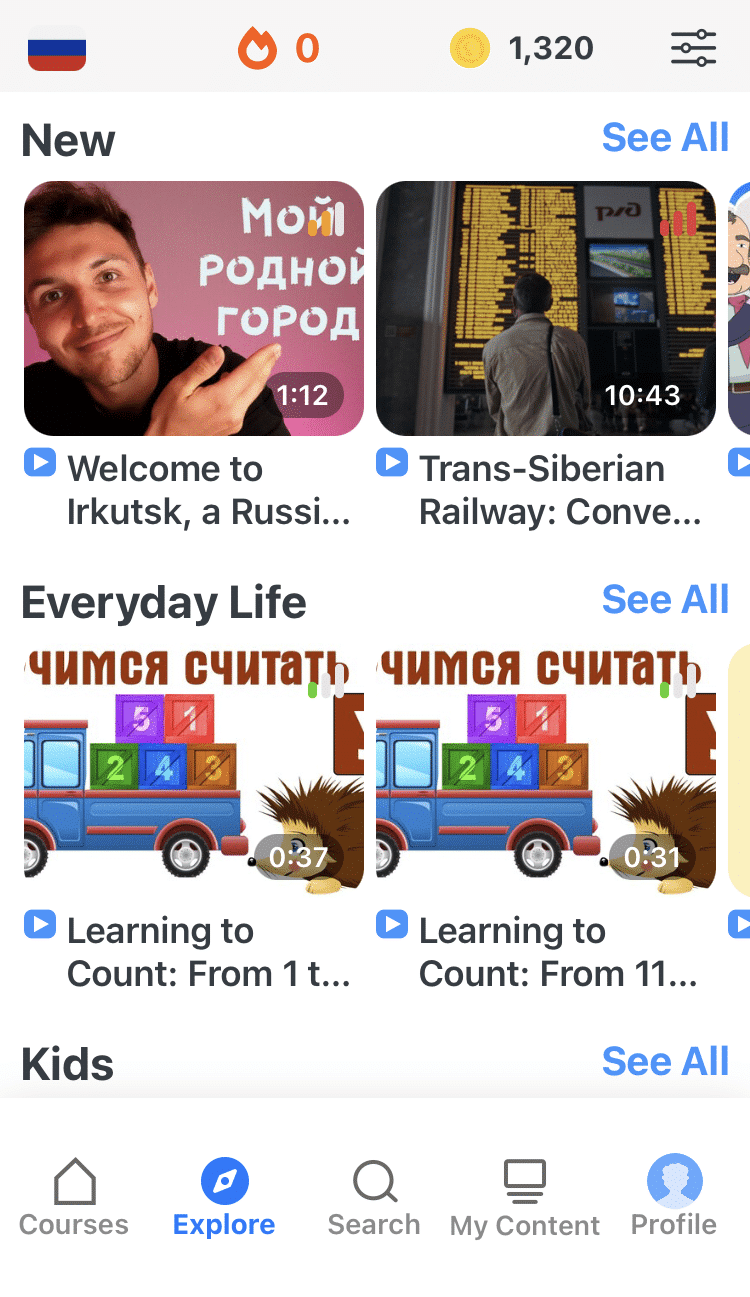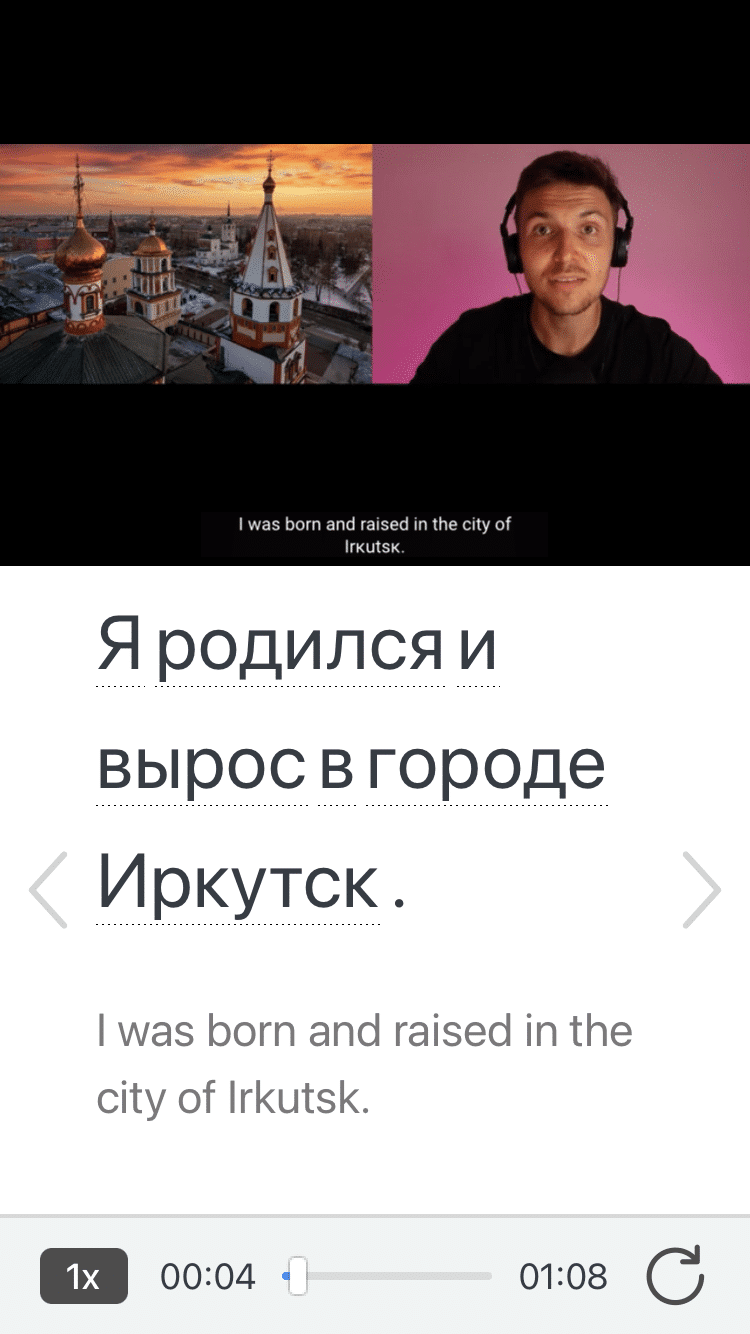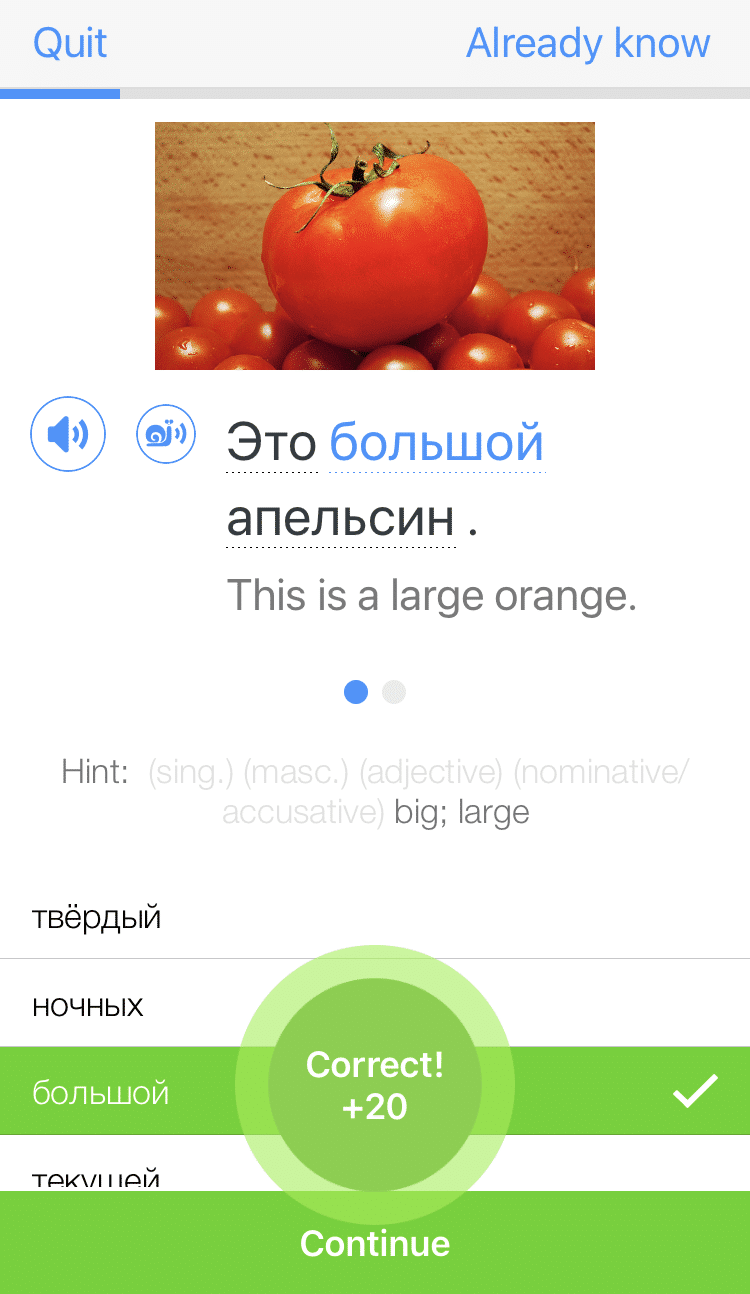
6 Ways to Immerse Yourself in Russian at Home
Don’t you need to be in-country to achieve full Russian immersion?
Not at all!
As a savvy Russian learner, you know that you need to work hard to achieve a high level of proficiency in Russian.
So how can you completely immerse yourself in Russian without leaving your home?
Fear not, because I’m about to help you bring Moscow to your doorstep.
Contents
- 1. Create a Russian Corner
- 2. Label Everything with Russian Words and Phrases
- 3. Use Technology
- 4. Keep a Diary or Journal in Russian
- 5. Plan a Trip to Russia
- 6. Find Real Russians
- And One More Thing...
Download: This blog post is available as a convenient and portable PDF that you can take anywhere. Click here to get a copy. (Download)
1. Create a Russian Corner
As someone who works from home, you’d think I can just type away at my laptop from my bed. But in reality, I have a little corner of the kitchen that I call “my office,” where I set up every day. When I sit down at my office—laptop and coffee ready—I’m mentally prepared to work.
As a Russian language learner, you can also train your brain to be prepared to study by creating a Russian corner in your room.
What might you put there?
Anything that reminds you of Russian and your desire to learn Russian. Anything that might inspire you to take that trip to Russia one day.
Buy Russian posters—either of Russian movies or famous Russian landmarks—and hang them on your wall. Put a desk in the same corner, add a bookshelf and put your Russian books there.
Make sure you have access to Russian music by some of your favorite Russian singers, and add some DVDs of your favorite Russian movies (or Netflix ’em).
And while you’re sitting there, listen, watch and hunt down more online Russian language resources.
Also, leave some space on that desk so you can read your books or write in your Russian journal.
The bottom line is: everything you do in this corner should be in Russian!
2. Label Everything with Russian Words and Phrases
If you’re just starting, Vocabulary Stickers is a great option for Russian labels.
They’re fun, colorful labels representing the most important words in a language that you can attach to everyday items at home or work.
They’re even conveniently coded by grammatical gender, so you learn the gender of each word as you learn the word itself.
Connecting the written word with the actual item gives you visual reinforcement.
But there are ways to make it more interesting:
- Quiz yourself. Every week—set a certain time aside—take your old labels off and see if you can attach each and everyone without making a single mistake. If you do—or if you can’t remember a word—start over until you get it right.
- Add new words every week. Make your labels in your Russian corner, attach them to the items and stare at each until you’re sure that you’ve got it. You’ll find out the next week if you really do or not!
- Play games with your Russian labels. Do you have friends who drop by? If they’re studying Russian, label their items in Russian as well. Have them help you: See if you both remember the item the next time they drop by. Maybe you could even make them a name tag with “friend” written along with their name.
Come to think of it, you can do this with your family!
Make tags that say “mom,” “dad,” “brother” and “sister” (maybe even “cat” or “dog,” but good luck keeping anything on them!). Ask them nicely if they will wear them. If not, ask them if you can label them on your label-reattachment day, so that you remember the word.
Over time, you can also add adjectives to your nouns.
Or even better, make separate labels for nouns and adjectives, so you can mix up the adjectives each week and, thus, learn new phrases.
3. Use Technology
You use technology every day. You’re tuned in to the news, pop culture and social media sites in almost every moment. In fact, it’s getting harder and harder to escape!
But, if you’re trying to immerse yourself in Russian, you don’t want to escape.
Rather, you should find a way to use the available technology to help immerse yourself even more.
Video and Audio Media
Whether sitting in your Russian corner or out for a walk, audio media is a great way to immerse yourself in Russian.
You can listen to Russian music, watch Russian TV or movies (the Soviet movie studio MosFilm even has a dedicated YouTube Channel where you can watch all the classics of Soviet cinema!), listen to podcasts, watch cartoons, etc.
Some of these sites will have subtitles; others will not. Some you will understand; others you will not.
But whether or not you understand or are even listening actively, just having the sound of Russian playing in the background will help you immerse yourself in the language.
Videos are valuable for giving you visual cues like actions and emotional expressions, which can give you context to help you figure out meanings while listening.
There are many online places to find authentic Russian you can immerse yourself in.
The key is to make sure you find a source you can trust (for language accuracy, quality subtitles, etc.) and has engaging content. This will help you stay motivated and keep trying.
For example, FluentU is a language learning program that immerses you in Russian videos. This gets you used to how the language sounds at its natural pace and pronunciation.
FluentU takes authentic videos—like music videos, movie trailers, news and inspiring talks—and turns them into personalized language learning lessons.
You can try FluentU for free for 2 weeks. Check out the website or download the iOS app or Android app.
P.S. Click here to take advantage of our current sale! (Expires at the end of this month.)
Print Media
There are several Russian bookstores online. And, if you have a Russian grocery store in your city, take a look around—they might also have a book section.
But one warning about buying books, especially if you’re a beginner in Russian: So many new language learners run out and buy children’s books, but be careful if you try that for Russian.
Many use diminutives or other cute phrasings that can be harder to understand than simplified readers or other near-authentic materials that are just as good for beginners.
Russian teachers know that Russian literature can be daunting in its original form, and many have spent time editing works to be accessible to learners at all levels.
Instructors at Middlebury, for example, have created this tripartite literary reading site, where the first option for each text is for early learners, the second for intermediate and the third for advanced.
Go here, and you’ll be reading samples of real Russian literature, but at an appropriate level!
There’s also “print” media available online: You can read Russian news, Russian blogs and even read about the Russian government on its official site.
(You can also buy Russian audiobooks to listen as you take that daily walk.)
You might not understand everything, but that’s okay. That’s sometimes all it takes to proceed to that next step in learning Russian!
Your Electronic Devices
Do you have a computer? A tablet? A cell phone? You must have one of those if you’re reading this blog.
Most devices allow you to select the language its in. Why not switch your device to Russian? You’ll be reading Russian every time you use it!
Social Media
Do you have a Facebook account? Did you know that you can change the language?
It’s as easy as going to “Settings” and “Language” and then choosing “Russian.”
If that’s not enough for you, you can always join the Russian version—vKontakte—where everything can be in Russian from the start!
Do you have a Twitter account? Same deal! You can even send tweets in Russian. Some teachers require you to send micro-writings in this form. Get ahead start and doing it yourself.
Immersion Software
- Instant Immersion. Instant Immersion is a beginner crash course for anyone looking to quickly gain basic Russian communication skills. It offers three total levels. The first level focuses on the essentials. The second level focuses on speaking. The third level focuses on holding a conversation and navigating business settings. Instant Immersion also lets you record yourself speaking and compare it directly to a native Russian speaker. Finally, it aims to make the learning experience fun by interspersing games, quizzes and video lessons.
- Rocket Languages. With each level containing over 30 audio lessons (25 minutes each), you’ll learn useful Russian words and phrases in addition to grammar rules. Rocket Languages also helps you practice speaking and writing Russian. For instance, you can record your pronunciation and compare yourself to a native Russian speaker. There are over 4,000 voice recognition phrases, so there’s plenty to practice! Check out our full Rocket Languages review here.
- Transparent Language. Transparent Language’s online Russian program offers comprehensive resources, including materials to help you improve your pronunciation, speaking skills, vocabulary, writing and grammar. The program tracks what words and phrases you’ve learned to see how far you’ve come. Many learning activities (including multiple choice questions) are also speech-enabled to help you practice pronunciation and improve your speaking skills.
- Pimsleur. Pimsleur helps you hit the ground running by getting you speaking on day one with the ultimate goal of helping you speak Russian like a native. It uses real-world contexts to improve your accent and help you learn functional grammar rules and vocabulary. The software is also scientifically designed to help you store vocabulary and grammar rules in your long-term memory. Read our in-depth Pimsleur review here.
4. Keep a Diary or Journal in Russian
Maybe keeping a diary sounds a bit ambitious for a beginner, but even if you’re just getting started on your Russian studies, you can write something.
It’s as easy as setting aside five minutes a day.
The trick here is to teach yourself to think and write in Russian.
Of course, you’ll have to look up new words, but limit the number each day and make sure that you use them repeatedly so that you really learn them.
Here are some ideas:
- Remember those labels you made? Create a written inventory of everything you own, and then describe each item with descriptive and possessive adjectives.
- Start writing a biography. What’s your name? Where do you live? Where and what do you study? Add to it as time goes on. Over time, it will become a written Russian elevator speech you can present to anyone!
- Write about how you spent your day. What did you do in the morning, the afternoon, evening? When do you go to sleep or wake up? What happened during the day that made it stand out? Or what frustrated you?
- Did you meet anyone interesting today? Write about them!
- Write about the Russian media you consumed. Did you read one of your Russian books? Watch a Russian movie? A TV show? Listen to some Russian music? Write about it!
- Journal your opinions and thoughts. Do you have a reaction to the news? To an election? Write about it!
These can be as simple as “I liked it!” or as in-depth as a full-blown essay discussing what you saw, read or listened to, complete with analysis.
It really doesn’t matter. As long as you write something every day!
5. Plan a Trip to Russia
You can’t go to Russia right now, but why not plan a trip there anyway using only Russian-language resources?
Do you still have space on the wall in your Russian corner? Buy a map of Russia, in Russian. Get some pins, and select the cities you want to visit.
Now research them!
St. Petersburg has an official travel site that’s in both Russian and English, as does one of the most famous art museums in the world: the Hermitage.
Try the Russian version first, and switch back to English for help until you feel more comfortable. Then dive into searches for yourself!
If you want to do everything from scratch, go to Google’s Russian site, switch your keyboard to Cyrillic and search for sites in each city you wish to visit.
Here are some steps to get you started:
- Research places for your itinerary and lodging. Find a place to stay, research museums and track down some restaurants—do they have food you want to try? Look at train or plane schedules. Or for how to rent a car.
- Maybe you want to stay for longer? Research apartments! Look for furniture to buy or rent. Research the exchange rate and see how much you’re going to spend.
- Create a budget. Russia is more expensive than you might think.
- Put together a travel guide. Take all this information and assemble your virtual travel guide. You can also get some excellent travel guides and phrasebooks about Russia from Lonely Planet.
- Take a Russian travel course. Another resource you may find useful for this project—especially if you’re closer to a beginner level—is Russian Accelerator. It’s a video course specifically for Russian travel.
- Learn about Russian culture and history. Read up on the history and contemporary culture of where you want to go, again only using Russian language sources. Write up summaries to add to your travel guide. Look at concert or play schedules. Find out how you can buy a ticket or reserve a seat in advance.
6. Find Real Russians
Speaking with others is a great way to immerse yourself in Russian!
If you’re in a scheduled class, they’ll likely encourage you or even help you find Russian speakers you can talk to outside of classes.
But what if you’re trying to learn independently? Depending on where you live, this might be a challenge, but there are always ways.
- Does your town have a Russian cultural center? They’re usually staffed by Russian volunteers who will be happy to speak to you. While you’re there, pick up a schedule of events and try to attend some for a full Russian immersion experience with real Russians!
- Does your town have a large refugee or immigrant community? Is one of the groups Russian? If so, step up and volunteer to work with them. Help them get settled in, find their way around town, go shopping. They might not know much English, but what better opportunity to immerse yourself in Russian conversation than while doing something good for others?
- Find a conversation partner. If you’re in a small town with none of these possibilities, go back to technology and find a conversation partner that way. italki, MyLanguageExchange and Conversation Exchange are three possibilities. Make yourself comfy in your Russian corner and talk until the wee hours of the morning! You can check out our full italki review here.
Whatever method you choose, what’s most important is to surround yourself with as many Russian sounds and produce as many Russian words as often as possible.
And when you think you’re ready and have the time, hop on a plane and go to Russia!
You’ll have already planned the trip.
Download: This blog post is available as a convenient and portable PDF that you can take anywhere. Click here to get a copy. (Download)
And One More Thing...
If you love learning Russian and want to immerse yourself with authentic materials from Russia, then I should also tell you more about FluentU.
FluentU naturally and gradually eases you into learning the Russian language and culture. You'll learn real Russian as it's spoken by real Russian people!
FluentU has a very broad range of contemporary videos. Just a quick look will give you an idea of the variety of Russian-language content available on FluentU:

FluentU makes these native Russian videos approachable through interactive transcripts. Tap on any word to look it up instantly.

Access a complete interactive transcript of every video under the Dialogue tab. Easily review words and phrases with audio under Vocab.

All definitions have multiple examples, and they're written for Russian learners like you. Tap to add words you'd like to review to a vocab list.
And FluentU has a learn mode which turns every video into a language learning lesson. You can always swipe left or right to see more examples.

The best part? FluentU keeps track of your vocabulary, and gives you extra practice with difficult words. It'll even remind you when it’s time to review what you’ve learned. You'll have a 100% personalized experience.
Start using the FluentU website on your computer or tablet or, better yet, download the FluentU app from the iTunes or Google Play store. Click here to take advantage of our current sale! (Expires at the end of this month.)



